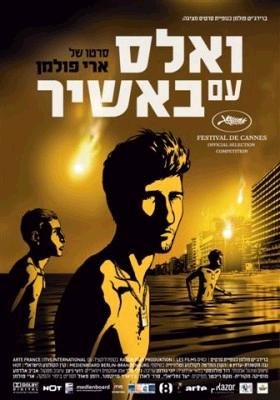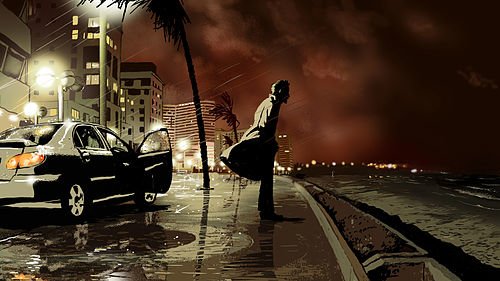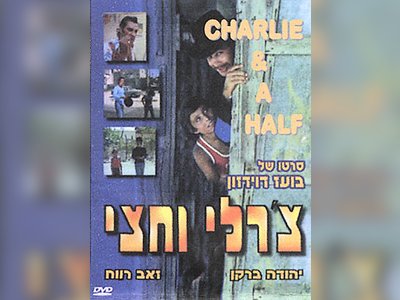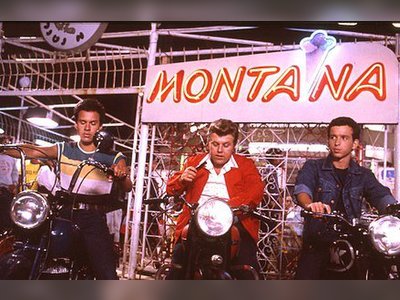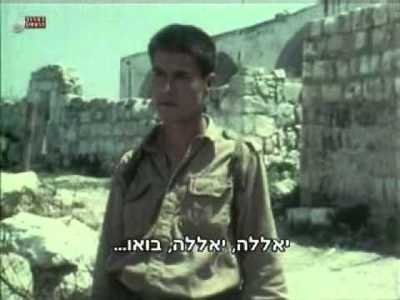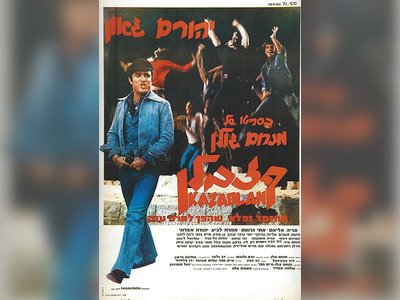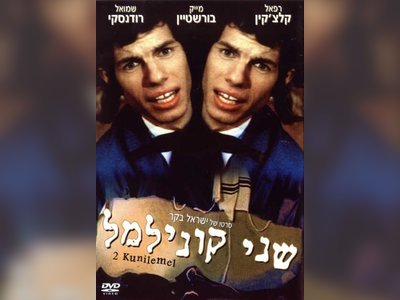מורשת גדולי האומה
בזכותם קיים
beta
"Waltz with Bashir"
Is a compelling docudrama war film directed by Ari Folman, set against the backdrop of the First Lebanon War. The film features illustrations by David Polonsky and animation directed by Yoni Goodman. It has been described by its creators as a "docu-memoir" but is also seen by some as having surrealistic elements in its scenes.
The film received numerous awards, including the Golden Globe, César Award, and Ophir Award, and was nominated for the Academy Award for Best Foreign Language Film. In many cases, it marked the first time an Israeli film, particularly a docudrama or documentary, had achieved such international recognition.
The title of the film comes from a scene within the movie where a soldier named Samuel Frenkel, a comrade of Folman, is seen "waltzing" with a machine gun during a battle in the city of Beirut, set against a giant poster of Bashir Gemayel, the Christian Phalangist leader whose assassination played a role in the Sabra and Shatila massacre.
Plot Summary:
Ari Folman, a 19-year-old infantry soldier in the Israel Defense Forces in 1982, meets an old friend who tells him about recurring nightmares related to their experiences during the war. In these nightmares, 26 ferocious dogs roam the streets of Tel Aviv, terrorizing and attacking civilians. Folman gradually starts to recover fragments of his own memory and is haunted by a vision of the Sabra and Shatila massacre. He realizes that his unit was present in the area when the massacre occurred, but he cannot remember his involvement.
Folman seeks out other friends who were with him in Beirut during the war to piece together what happened. His friends share their own memories, and some of these memories are presented through animation. As the narrative unfolds, it becomes clear that Folman's unit was involved in disturbing events, and he grapples with his own role in the tragic events of that time.
The film concludes with footage from a television report that aired after the Sabra and Shatila massacre, showing women mourning and dead bodies in the camp.
Production:
The film's production took four years and involved collaboration between Israeli, German, and French filmmakers. It employs a unique animation technique called "Cutout," combining rock music from the 1980s, graphic elements, and surrealistic scenes. Much of the film is created using this Cutout animation technique in Flash software.
In February 2009, a graphic novel adaptation of the film was published by Keter Zmora-Bitan Dvir, titled "Waltz with Bashir: A Lebanon War Story."
Awards:
The film received widespread acclaim and won numerous awards worldwide. Notable accolades include the Golden Globe for Best Foreign Language Film, César Award for Best Foreign Film, Ophir Awards in multiple categories (including Best Director, Screenplay, Editing, Soundtrack, and Art Direction), and the Best Film award at the Sarajevo Film Festival. It was also the Israeli entry for the Academy Award for Best Foreign Language Film, making it the first Israeli animated film to receive such recognition.
At the 81st Academy Awards, "Waltz with Bashir" was nominated for Best Foreign Language Film but lost to the Japanese film "Departures."
Critical Reception:
The film received both praise and criticism in Israel and internationally. Some hailed its innovative format and artistic design, while others questioned its political implications and perceived anti-Israeli stance. Critics such as Shmulik Duvdevani praised the film's attempt to address Israeli guilt, while Meir Schnitzer criticized it as a left-wing film that ignores Palestinian terrorism against Israel.
The film's director, Ari Folman, aimed to explore the issue of Israeli culpability during the Lebanon War, a topic that previous Israeli films, such as "Waltz with Bashir," had largely avoided.
In conclusion, "Waltz with Bashir" is a groundbreaking film that blends animation, memory, and documentary elements to explore the psychological toll of war on soldiers. Its artistic approach and willingness to tackle complex and uncomfortable subjects make it a unique and thought-provoking cinematic experience.
The title of the film comes from a scene within the movie where a soldier named Samuel Frenkel, a comrade of Folman, is seen "waltzing" with a machine gun during a battle in the city of Beirut, set against a giant poster of Bashir Gemayel, the Christian Phalangist leader whose assassination played a role in the Sabra and Shatila massacre.
Plot Summary:
Ari Folman, a 19-year-old infantry soldier in the Israel Defense Forces in 1982, meets an old friend who tells him about recurring nightmares related to their experiences during the war. In these nightmares, 26 ferocious dogs roam the streets of Tel Aviv, terrorizing and attacking civilians. Folman gradually starts to recover fragments of his own memory and is haunted by a vision of the Sabra and Shatila massacre. He realizes that his unit was present in the area when the massacre occurred, but he cannot remember his involvement.
Folman seeks out other friends who were with him in Beirut during the war to piece together what happened. His friends share their own memories, and some of these memories are presented through animation. As the narrative unfolds, it becomes clear that Folman's unit was involved in disturbing events, and he grapples with his own role in the tragic events of that time.
The film concludes with footage from a television report that aired after the Sabra and Shatila massacre, showing women mourning and dead bodies in the camp.
Production:
The film's production took four years and involved collaboration between Israeli, German, and French filmmakers. It employs a unique animation technique called "Cutout," combining rock music from the 1980s, graphic elements, and surrealistic scenes. Much of the film is created using this Cutout animation technique in Flash software.
In February 2009, a graphic novel adaptation of the film was published by Keter Zmora-Bitan Dvir, titled "Waltz with Bashir: A Lebanon War Story."
Awards:
The film received widespread acclaim and won numerous awards worldwide. Notable accolades include the Golden Globe for Best Foreign Language Film, César Award for Best Foreign Film, Ophir Awards in multiple categories (including Best Director, Screenplay, Editing, Soundtrack, and Art Direction), and the Best Film award at the Sarajevo Film Festival. It was also the Israeli entry for the Academy Award for Best Foreign Language Film, making it the first Israeli animated film to receive such recognition.
At the 81st Academy Awards, "Waltz with Bashir" was nominated for Best Foreign Language Film but lost to the Japanese film "Departures."
Critical Reception:
The film received both praise and criticism in Israel and internationally. Some hailed its innovative format and artistic design, while others questioned its political implications and perceived anti-Israeli stance. Critics such as Shmulik Duvdevani praised the film's attempt to address Israeli guilt, while Meir Schnitzer criticized it as a left-wing film that ignores Palestinian terrorism against Israel.
The film's director, Ari Folman, aimed to explore the issue of Israeli culpability during the Lebanon War, a topic that previous Israeli films, such as "Waltz with Bashir," had largely avoided.
In conclusion, "Waltz with Bashir" is a groundbreaking film that blends animation, memory, and documentary elements to explore the psychological toll of war on soldiers. Its artistic approach and willingness to tackle complex and uncomfortable subjects make it a unique and thought-provoking cinematic experience.
- ואלס עם באשירhe.wikipedia.org
